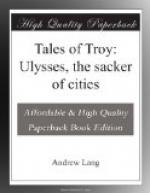So he walked cautiously down the side of the brook which ran between high banks deep in trees, and followed it till it reached the river Xanthus, on the left of the Greek lines. Here he found Greek sentinels set to guard the camp, who cried aloud in joy and surprise, for his ship had not yet returned from Delos, and they could not guess how Ulysses had come back alone across the sea. So two of the sentinels guarded Ulysses to the hut of Agamemnon, where he and Achilles and all the chiefs were sitting at a feast. They all leaped up, but when Ulysses took the Luck of Troy from within his mantle, they cried that this was the bravest deed that had been done in the war, and they sacrificed ten oxen to Zeus.
“So you were the old beggar,” said young Thrasymedes.
“Yes,” said Ulysses, “and when next you beat a beggar, Thrasymedes, do not strike so hard and so long.”
That night all the Greeks were full of hope, for now they had the Luck of Troy, but the Trojans were in despair, and guessed that the beggar was the thief, and that Ulysses had been the beggar. The priestess, Theano, could tell them nothing; they found her, with the extinguished torch drooping in her hand, asleep, as she sat on the step of the altar, and she never woke again.
THE BATTLES WITH THE AMAZONS AND MEMNON—THE DEATH OF ACHILLES
Ulysses thought much and often of Helen, without whose kindness he could not have saved the Greeks by stealing the Luck of Troy. He saw that, though she remained as beautiful as when the princes all sought her hand, she was most unhappy, knowing herself to be the cause of so much misery, and fearing what the future might bring. Ulysses told nobody about the secret which she had let fall, the coming of the Amazons.
The Amazons were a race of warlike maids, who lived far away on the banks of the river Thermodon. They had fought against Troy in former times, and one of the great hill-graves on the plain of Troy covered the ashes of an Amazon, swift-footed Myrine. People believed that they were the daughters of the God of War, and they were reckoned equal in battle to the bravest men. Their young Queen, Penthesilea, had two reasons for coming to fight at Troy: one was her ambition to win renown, and the other her sleepless sorrow for having accidentally killed her sister, Hippolyte, when hunting. The spear which she threw at a stag struck Hippolyte and slew her, and Penthesilea cared no longer for her own life, and desired to fall gloriously in battle. So Penthesilea and her bodyguard of twelve Amazons set forth from the wide streams of Thermodon, and rode into Troy. The story says that they did not drive in chariots, like all the Greek and Trojan chiefs, but rode horses, which must have been the manner of their country.




